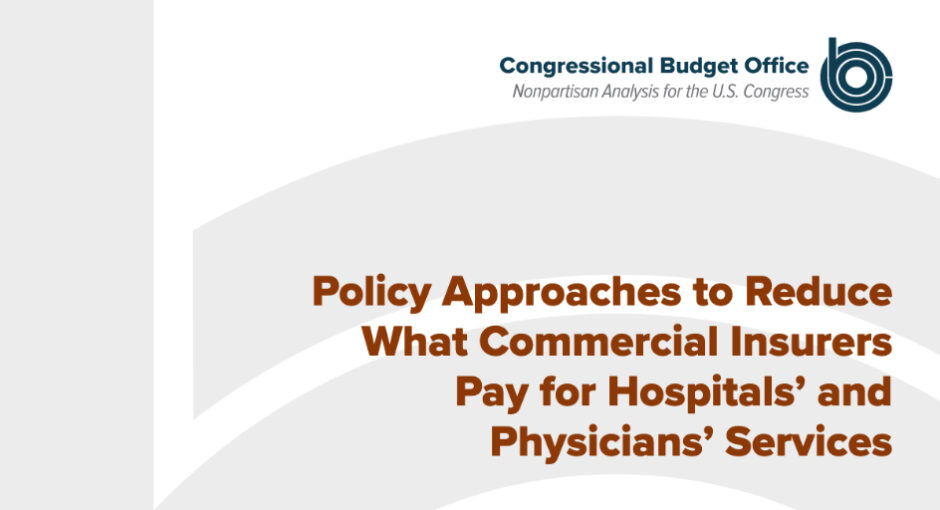Changing the 340B patient definition “might reduce hospitals’ and physicians’ incentives to consolidate,” but to what extent “remains highly uncertain,” the Congressional Budget Office says in a new policy analysis.
House Budget Committee Chair John Yarmuth (D-Ky.) asked CBO to recommend how Congress could reduce the prices that commercial insurers pay hospitals and physicians for services, thereby lowering health insurance premiums and federal spending on subsidies for commercial insurance. CBO’s analysis noted that the prices that private insurers pay hospitals and physicians are much higher on average and have been rising faster than the prices paid by public payers.
CBO published its findings Sept. 29. Its economists and budget analysts produce dozens of reports and hundreds of cost estimates for proposed legislation every year.
CBO evaluated three broad approaches to reducing the prices that private insurers pay providers:
- capping what hospitals and physicians can charge insurers or taxing them when their prices break a defined barrier
- promoting competition among providers
- promoting price transparency.
It found that “price-cap policies could have the largest effects on prices.” Adopting a comprehensive set of such policies, it said, could reduce hospital and physician prices by more than 5% in the first 10 years after the policies were enacted, compared with reductions in the 1% to 3% range for competition policies and 0.1% to 1% for transparency policies.
340B as a Factor in Market Consolidation
340B came up in CBO’s analysis of policies to discourage consolidation of markets.
“There are no restrictions on the prices that covered entities charge commercial insurers,” CBO said. “As a result, hospitals can realize substantial savings when they administer discounted medications to insured patients, particularly patients with commercial insurance, which tends to have high reimbursement rates compared with 340B purchase prices.”
“Some researchers have raised concerns that hospital systems may be acquiring physicians’ practices in part to achieve those savings,” it said. Others however “found little evidence that the 340B program had contributed to increases in vertical integration between hospitals and physicians,” CBO noted.
“A policy change that applied drug discounts under the 340B program on a patient-level basis—that is, to patients with certain characteristics rather than to all patients at certain sites of care—might reduce hospitals’ and physicians’ incentives to consolidate,” CBO said. “But the extent to which such a policy would deter consolidation remains highly uncertain.”
CBO did not elaborate on what it meant by “patients with certain characteristics.” Drug manufacturers and others have argued for years that 340B pricing should be reserved exclusively for drugs dispensed or administered to low-income uninsured patients. 340B covered entities have countered that they depend on revenue from billing commercial insurers above 340B acquisition cost to help offset the cost of serving low-income, uninsured, and underinsured patients. In 2005, federal health officials said in a 340B hemophilia treatment center manual, “Some critics of HTCs have recommended that they bill insurance carriers at 340B prices. However, to do so would require HTCs to forgo the income that 340B was enacted to create.”
A federal district court in South Carolina, meanwhile, is considering a health center’s motion for an order declaring that the only statutory requirement for 340B eligibility of a person is that the person be a patient of a covered entity.
340B program guidance issued in 1996 says an individual is a patient for 340B purposes only if:
- the covered entity has established a relationship with the individual, such that the covered entity maintains records of the individual’s health care; and
- the individual receives health care services from a health care professional who is either employed by the covered entity or provides health care under contractual or other arrangements (e.g. referral for consultation) such that responsibility for the care provided remains with the covered entity; and
- with respect to grantee entities, the individual receives a health care service or range of services from the covered entity which is consistent with the service or range of services for which grant funding or federally-qualified health center look-alike status has been provided to the entity.
The definition says that HRSA does not deem an individual a patient of a covered entity if the only health care service the individual gets from the covered entity is the dispensing of a drug or drugs for subsequent self-administration or administration in the home setting.
The definition also says individuals registered in a state-operated or funded AIDS Drug Assistance Program (ADAP) that receives federal Ryan White funding are considered patients of the participant ADAP if so registered as eligible by the state program.
Hospital Facility Fees Also Discussed
In the same section of the analysis, CBO observed that Medicare pays more, in the form of a facility fee, for physician services provided in hospital outpatient departments than it does for the same services provided in a physician’s office or ambulatory surgical center. “Studies have found that the facility fees give hospitals an incentive to buy freestanding physicians’ practices and convert them” to hospital outpatient departments.
“Despite recent progress in equalizing payments among sites of care, some differences remain,” CBO said. “If Medicare’s site-neutral payment policies were extended to cover a broader set of services and facilities than they do now, consolidation would become less financially appealing.”


